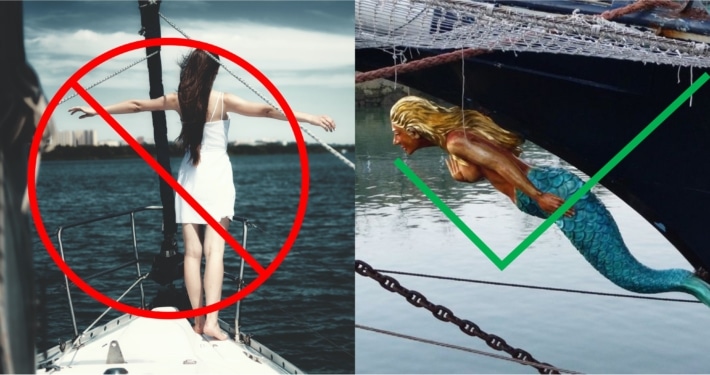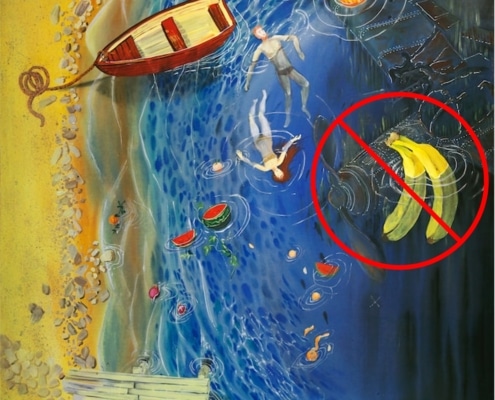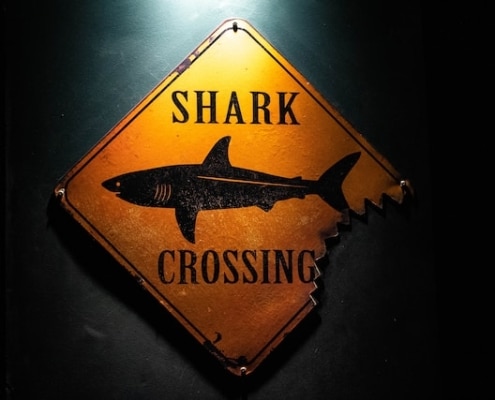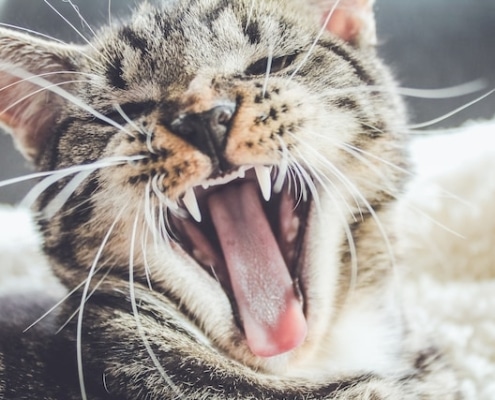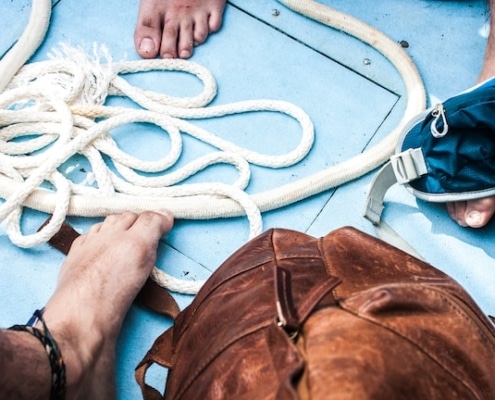Don’t Whistle!!
Learn more about sail trim with either NauticEd’s FREE Basic Sail Trim Course for any aspiring sailor, or learn more comprehensive techniques with the Advanced Sail Trim online course.
Top 10 Sailing Superstitions
To celebrate today’s Friday the 13th, and with Halloween around the corner, we thought it would be fun to share the top 10 sailing superstitions. Mariners have long believed that certain things can bring good or bad luck on a voyage. While some of these superstitions may seem silly or outdated, many people still believe in them today. Join us as we dive into the top mythical nautical superstitions that have woven themselves into the very fabric of maritime folklore.
Which Day to Set Sail?
Superstitious sailors believe that the only good day to set out sail was Sundays. For many, Sundays are a day of religious significance; perhaps sailors though sailing on Sunday might invoke divine protection and blessings.
There are plenty of days where it is considered back luck to sail:
- Thursdays (Thor’s day—the god of storms)
- Fridays—the day of Jesus’s crucifixion
- Saturdays—association with the god Saturn and his malevolent traits.
- The first Monday in April—when Cain killed Abel
- The second Monday in August—when Sodom and Gomorrah were destroyed
- The 13th of the month—perceived as negative (OOPS! Probably shouldn’t post this today – the 13th)
No Women on Board!
Superstition says that no women are allowed onboard a sailing ship. Women tempted and distracted the sailors and thereby caused angry seas. However, boats are named after women and referred to in the feminine. Also, topless or naked women were welcomed as they calmed the seas. This is reflected in typical figurehead statutes of a topless women perched on the ship’s bow.
Or maybe the guys just didn’t want to admit that women are often better sailors!
Watch Your Words
At sea or departing for sea, some words much be strictly avoided. No one can say ‘drowned’, ‘goodbye’, or ‘goodluck.’ Any of these words were surely to bring bad luck.
Drawing blood was the only curse reversal!!
Bad Luck Bananas
Bringing bananas on board a ship is considered very bad luck. There are several theories why:
- Ships used to transport bananas from tropical areas. Sailors would find out that deadly spiders often took shelter in the banana bunches as a hiding spot. Spider bites causes sailors to suddenly die.
- In the 18th century, many ships disappeared between Caribbean and the Mediterranean. These ships often were transporting bananas.
- Bananas go bad quickly causing fish to avoid the boats, rushing sailors to get to their destinations quickly, and the fermentation would cause deadly fumes.
Shark or Dolphin?
Sharks near a sailing ship are a bad omen while dolphins nearby predicted good fortune. Sharks are predatory and are associated with misfortune. Their presence near ships predicted stormy seas and challenging conditions. Dolphins, on the other hand, have been known to guide ships and lead them safety through waters. This has led sailors to believe that these benevolent animals offer protection.
Cool Cats
Cats on a ship are good omens and they should be cared for by mariners. Cats hunt and kill rodents. These rodents carried diseases, gnawed on ropes making for perilous sailing, and ate the food cargo. Since they solved this problem and provided some companionship, cats were kept around as good luck charms.
Whistle a Tune (or Storm)
Whistling was not permitted onboard. Whistling or singing into the wind would ‘whistle up a storm.’ Mariners believed that whistling challenged the wind who would therefore get angered and cause bad weather and stir up the sea.
Watch Your Step!
Superstition dictates that you should never step onboard a ship with your left foot. One’s left foot was associated with the devil so stepping onto a ship with your left food would bring bad luck. Starting the journey with/on the right food was key for a good voyage. Speaking of feet, flat footed people were not wanted onboard as they were considered unlucky.
The Curse of the Albatross
The persistent albatross has both positive and negative associations for mariners. Sailors have long believed that seeing one at sea can bring good luck. However, birds, particularly the albatross were associated with carrying the souls of dead sailors. So killing an albatross would certainly bring back luck by invoking the fury of the sea. This is further emphasized by Coleridge’s poem “The Rime of the Ancient Mariner’ where the narrator sailor kills an albatross and bring disaster and death to his ship and the sailors.
Red Sky Red Sky
“Red sky at night, sailor’s delight. Red sky in morning, sailors take warning.”
This superstition is based on weather prediction. A red sky at night suggests the sun is shining through stable atmospheric pressure. This leads to calm favorable sailing. If the morning sky is red, there is likely a storm coming. This is because the sun is shining through a high concentration of particles indicating a low-pressure system which often brings storms and rain.
These mythical nautical superstitions remind us of the rich tapestry of seafaring traditions that have shaped our maritime culture. While modern technology has dispelled most of these beliefs, the allure of the unknown and the romance of the sea continue to fuel our fascination with these age-old tales.
Cheers!
– Grant
P.S. “Cheers” is on the accepted lucky list.
Learn Basic Sail Trim for FREE...
A FREE 1-2 hour course that teaches how to work with sails to get your boat moving. The free Basic Sail Trim Course is for any aspiring sailor as well as experienced sailors wanting to learn more. Or, consider upgrading to the Skipper Course Bundle to become a fully competent skipper!


